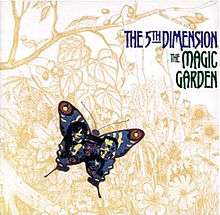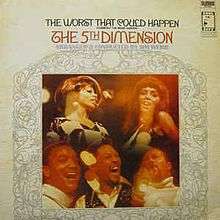The Magic Garden
| The Magic Garden | ||||
|---|---|---|---|---|
 | ||||
| Studio album by The 5th Dimension | ||||
| Released | December 1967 | |||
| Recorded | July 15, 1967 – November 1967 | |||
| Studio | United/Western Recorders, Los Angeles | |||
| Genre | R&B, pop, soul, sunshine pop, psychedelic soul | |||
| Length | 35:29 | |||
| Label | Soul City Records | |||
| Producer | Bones Howe | |||
| The 5th Dimension chronology | ||||
| ||||
| Singles from The Magic Garden | ||||
| ||||
| Professional ratings | |
|---|---|
| Review scores | |
| Source | Rating |
| Allmusic | |
The Magic Garden is the second album by American pop group the 5th Dimension, released in 1967 (see 1967 in music). Considered a concept album, it tells the story of a couple's love and the end of their relationship. In more recent discussions of the album, that love affair is said to be about Jimmy Webb — who authored 10 of the album's 11 tracks — and his time with singer and then-girlfriend Susan Horton (In fact, the name Susan is referenced by name on the track "Dreams/Pax/Nepenthe"). The only non-Jimmy Webb song on the album, "Ticket to Ride", is an unused track from the group's first album, Up, Up and Away, the title track of which was also written by Webb.
Performance
Following the ubiquitous success of the group's previous effort, "Up, Up and Away", which spawned two Top-20 singles on the Billboard Pop Chart, expectations were high for The Magic Garden. However, the album just missed the Billboard Hot 100, and no Top 20 singles would emerge from it in the USA. The first single, "Paper Cup", rose only to #32. "Carpet Man", the album's second single, would reach Top 30 status, landing at #29 in the USA, but found great success in Canada, charting at #3 on Toronto's CHUM chart, and #11 on the RPM chart, in March 1968. The group performed the song on Kraft Music Hall - on an episode hosted by John Davidson - and on the Ed Sullivan Show.
The Worst That Could Happen
One of the album's cuts, "The Worst That Could Happen", was culled from the LP and recorded as a single by Johnny Maestro & the Brooklyn Bridge in January 1969, and became a smash top 3 hit in the USA. The 5th Dimension would have to wait for their next album, Stoned Soul Picnic, to achieve the same chart placement. To capitalize on the success of "The Worst That Could Happen", Soul City Records re-titled The Magic Garden and re-released it as The Worst That Could Happen. The re-release reverses the front and back covers of the original LP. Although now titled The Worst That Could Happen on the album cover, the label on the vinyl itself still carried The Magic Garden as its title.
The original Magic Garden album was released in both mono (SCM-91001) and stereo (SCS-92001). It is unknown whether its reissue as The Worst That Could Happen was also reissued in mono, as Soul City's parent company, Liberty Records (and most other record labels) began phasing out monaural releases in the USA in 1968: stereo copies keep its original matrix number on Soul City / Liberty, SCS-92001.

Cultural Impact
"Carpet Man" has been covered by the Nocturnes, the Charade, the Parking Lot, and by the founder of the 5th Dimension's Soul City record label, Johnny Rivers. Dusty Springfield recorded a cover of "The Magic Garden", which surfaced on a Springfield anthology in the 1990s. [2]
Track listing
All songs were written by Jimmy Webb, except where noted.
Side One
- "Prologue" – 1:24
- "The Magic Garden" – 2:48
- "Summer's Daughter" – 3:03
- "Dreams/Pax/Nepenthe" – 3:24
- "Carpet Man" – 3:16
- "Ticket to Ride" (John Lennon, Paul McCartney) – 4:00
Side Two
- "Requiem: 820 Latham" – 4:26
- "The Girls' Song" – 4:09
- "The Worst That Could Happen" – 2:37
- "Orange Air" – 2:38
- "Paper Cup" – 2:48
- "Epilogue" – :56
Personnel
Music
- Billy Davis, Jr. – lead vocals (track 9), background vocals
- Florence LaRue – lead vocals (tracks 5, 8), background vocals
- Marilyn McCoo – lead vocals (track 8), background vocals
- Lamonte McLemore – background vocals
- Ron Townson – background vocals
- Jimmy Webb – orchestra conductor
The credited musicians (roles not specified) are Hal Blaine, Joe Osborn, Larry Knechtel, Mike Deasy, Tommy Tedesco, Dennis Budimir and Johnny Rivers.[3]
Production
- Jimmy Webb – music arranger
- Bones Howe – producer, engineer
- Armin Steiner – engineer
- Elliot Federman – audio mastering
- Mandana Eidgah – product manager
- Rob Santos – reissue producer
- Mike Hartry – digital transfers
- Joanne Feltman – archives coordinator
- Glenn Korman – archives coordinator
- Woody Woodward – art director
- Mathieu Bitton – reissue art director
- Ron Wolin – design
- Wayne Kimbell – illustrations
- Ed Osborne – photography
- George Rodriguez – photography
- Mike Ragogna – liner notes
Charts
Album
Billboard (North America)
| Year | Chart | Position |
|---|---|---|
| 1968 | Black Albums | 43 |
| 1968 | Pop Albums | 105 |
Singles
Billboard (North America)
| Year | Single | Chart | Position |
|---|---|---|---|
| 1967 | "Paper Cup" | Pop Singles | 34 |
| 1968 | "Carpet Man" | Pop Singles | 29 |
| 1970 | "The Girls'Song" | Pop Singles | 43 |